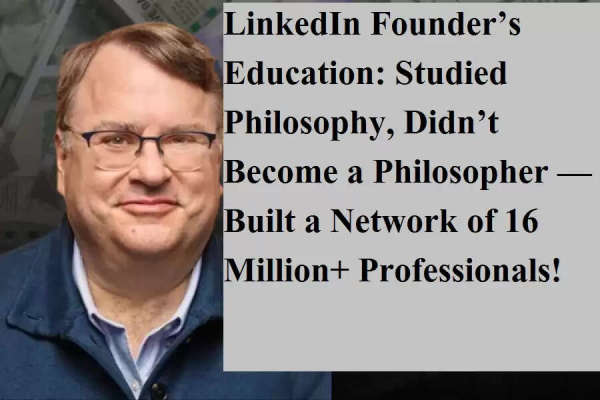
📘 Education of Reid Hoffman
Reid Hoffman, the co-founder of LinkedIn, is a renowned name in the world of technology and entrepreneurship. His thoughts and teachings on startup culture continue to inspire aspiring entrepreneurs globally.
Hoffman completed his undergraduate degree in Symbolic Systems from Stanford University in 1990. This interdisciplinary program blends computer science, psychology, and philosophy, helping him understand both technology and human behavior.
Later, he earned a master’s degree in philosophy from Oxford University in 1993. During his studies, he developed strong skills in deep thinking and problem-solving, alongside a passion for making a positive societal impact.
Though trained in philosophy, Hoffman realized he didn’t want to remain confined to academia. He sought real-world impact, which led him into the tech and business world. He worked at Apple and later became a key part of PayPal before founding LinkedIn in 2003 with his team.
After studying the human mind and societal systems, Hoffman built LinkedIn — a platform designed for professional networking, job search, and career development.
Founded in 2003, LinkedIn has grown into the largest professional network in the world.
In FY 2024, LinkedIn earned approximately $16.37 billion, including over $2 billion from premium subscriptions.
The platform saw a 10% revenue growth in the last year.
In 2016, Microsoft acquired LinkedIn for $26.2 billion, significantly boosting its reach and capabilities. Today, millions use it to:
Build professional profiles
Connect with peers and recruiters
Apply for jobs
Learn new skills
Recruit talented employees
Recently, Hoffman made headlines with a bold statement:
“Work-life balance in startups is a myth.”
He believes that total dedication and hard work are essential in the early phases of a startup. Sharing his own experience with LinkedIn and PayPal, he explained that employees often worked late into the night, even after dinner with family.
According to Hoffman:
“If someone is looking for balance in the early startup years, it might mean they lack the commitment required for success.”
However, he also clarified that this intense phase is temporary, and once a startup is established, balance becomes more achievable.
Reid Hoffman’s journey teaches us that a strong educational foundation, combined with deep thinking, problem-solving, and a desire to create impact, can lead to revolutionary innovations. Even if you study philosophy, you might end up changing the world — not through theories, but through action.